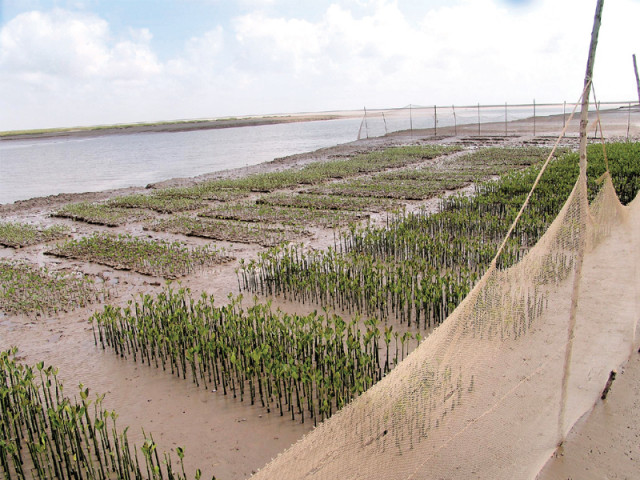Trouble downstream: ‘Indus Delta’s ecology is being harmed by reduced flows’
Experts say this has depleted mangrove forests and caused seawater to surge inland.

Mangrove saplings have been planted over 8,350 hectares near Keti Bandar under the Sindh Coastal Community Development project, which was completed by International Union for the Conservation of Nature (IUCN) in collaboration with the wildlife and forest department. PHOTO COURTESY IUCN
Until the late 19th century, the Indus Delta boasted of a thick mangrove plantation. The forests in the delta were so lush that there were even reports of an ‘Indus Tiger’ on the prowl within its recesses.
This description provided by Tahir Qureshi, a senior adviser at the International Union for Conservation of Nature (IUCN), seems too good to be true. On Sindh’s coast, mangroves - considered the first line of defence for coastal communities against hurricanes and cyclones - have all but withered away.
“In 1892, when 150 million acre feet (MAF) of water flowed down into the Indus Delta and the Arabian Sea, there were around 600,000 hectares of mangroves,” said Qureshi. “We now have about 95,000 hectares left.” One hectare - or 2.5 acres - can hold around a 1,000 mangrove plants.

Arif Ali Khokhar, a divisional forest officer in Sindh, said the decrease in freshwater down the Kotri barrage is a major factor for the decline in mangrove plantations. He is spearheading the departmental effort to increase mangrove plantations in the province’s coastal areas. Recently, he supervised the planting of mangroves over 8,350 hectares near Keti Bandar under the Sindh Coastal Community Development Project.
The forest department has also established a nursery of mangroves for the project funded by the Asian Development Bank. The nursery has around 2.1 million plants.
In 2009, Pakistan made it to the Guinness Book of World Records for planting 545,000 mangroves in a single day - the most number ever planted in 24 hours. The record was later broken by India. But, in March 2013, Pakistan will attempt to make the world record again. This time about 750,000 mangroves will be planted in a day, said Khokhar.
The encroaching sea
The mangroves aren’t the only things at risk. Sindh’s coastal communities also face major environmental concerns because of the decrease in water flows down the Indus. The siltation, which prevents seawater from intruding inland by creating a raised shoreline, is fast eroding as less downstream water means less silt.

“Under the provincial water accord, Sindh was guaranteed 10 MAF down the Kotri barrage. But leaving aside the unprecedented floods, not even between two and three MAF flow down into the Indus Delta and the Arabian Sea every year,” said Qureshi. “The sea has intruded up to 54 kilometres in the main course of the river Indus.”
The results are disastrous.
“The seawater destroys cultivable land and it is converting freshwater fisheries into marine fisheries and affecting the livelihood of fishermen,” said Qureshi. Worst of all, the potable water reservoirs are becoming salty because of the sea’s intrusion. “Down the Kotri Barrage, it has become a human problem now.”
Hunting for a solution
There are plenty of solutions to overcome the sea intrusion and shoreline erosion. The most obvious - increasing water flows to the Indus Delta and the Arabian Sea - might be too politicised to materialise in the short term. Engineering ideas such as reinforcing the shoreline by filling sand might not be economically feasible.
But Qureshi has a simple solution: Mangroves.
“With their extensive network of aerial roots, the mangroves hold the soil together and prevent erosion,” said Qureshi. “They become physical barriers to the seawater.”
Khokhar said the mangrove plantations also provide a habitat for fish to lay eggs in areas safe from predators. The plantations are known to recycle up to 80 per cent of atmospheric carbon dioxide and release oxygen.
Published in The Express Tribune, December 25th, 2012.


















COMMENTS
Comments are moderated and generally will be posted if they are on-topic and not abusive.
For more information, please see our Comments FAQ